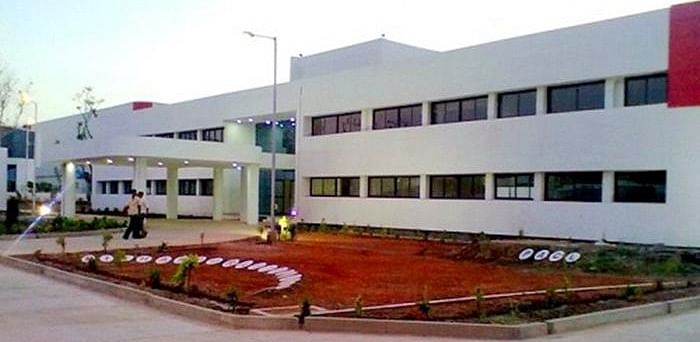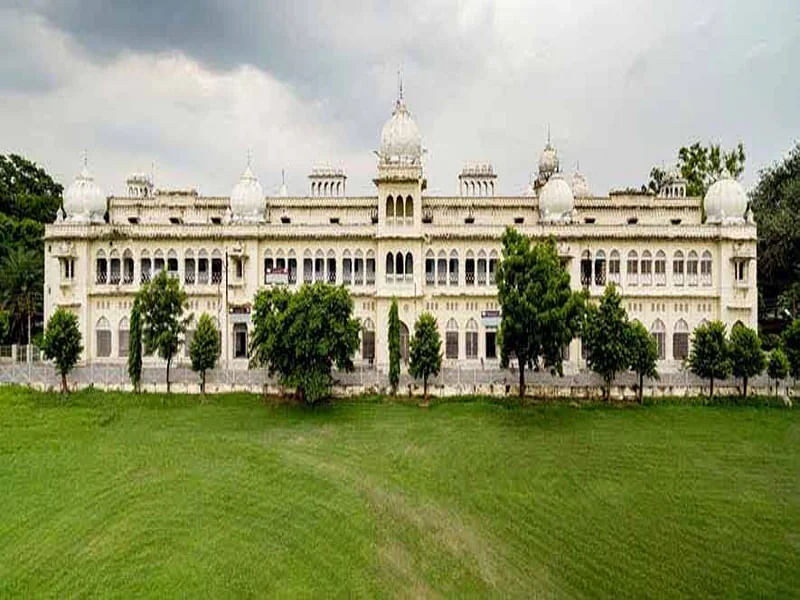MSc Astronomy: Course Details, Eligibility, Admission, Fees, Syllabus, Job Scope

MSc Astronomy is a two-year postgraduate degree programme that includes the in-depth study of celestial objects like stars, moon, galaxies, planets, comets, etc outside the earth’s atmosphere. The M.Sc Astronomy course gives insights into research-based topics like space physics and quantum mechanics.
Table of Contents
- About M.Sc in Astronomy Course
- Why Choose M.Sc Astronomy Course?
- MSc Astronomy Eligibility
- Master of Science in Astronomy Admission
- M.Sc Astronomy Entrance Exams
- Top MSc Astronomy Colleges in India with Fees
- MSc Astronomy Syllabus and Subjects
- MSc in Astronomy Course Comparison
- Courses After M.Sc Astronomy
- Jobs After MSc Astronomy
- MSc Astronomy Salary in India
- Skills to Excel in MSc Astronomy
MSc Astronomy Course Details
| Degree | Masters |
| Full Form | Master of Science in Astronomy |
| Duration | 2 Years |
| Age | 21 years |
| Entrance Exam | CUET, JEST, etc |
| Minimum Percentage | 50% in graduation |
| Average Fees | ₹3K - 2 LPA |
| Similar Options of Study | MSc Astrophysics |
| Average Salary | INR 6 to 20 lakh |
| Employment Roles | Research Scientists, Astronomers, etc |
About M.Sc in Astronomy Course
MSc Astronomy is one of the specializations under MSc courses. The course focuses on surface features, dimensions, and various laws of motion of heavenly bodies. The MSc Astronomy course is divided into 4 semesters covering subjects like Celestial and Fluid Mechanics, Positional Astronomy, Astronomical Techniques, etc.
Admissions for M.Sc in Astronomy is open to students who have completed their Bachelor’s with a minimum aggregate of 50% marks. The fees for MSc Astronomy range from INR 3,000 to 2 lakh.
The course opens up both academic and industry-oriented careers for students in several areas, including data science, statistics, and instrumentation. Hence, the job scope for MSc Astronomy graduates is good. Astronomers, Astronauts, Scientists, Physicists, etc are some promising job roles offered to students.
Why Choose M.Sc Astronomy Course?
MSc Astronomy course trains students in knowing the origin and existence of celestial marvels outside the atmosphere of the earth. Listed below are some reasons why a student should pursue MSc in Astronomy in India:
- The first known astronomy text on planetary motions and eclipses in India appeared in about 600 A.D. It was written by Aryabhata.
- The space economy in India is set to grow to USD 13 billion by 2025 at a CAGR of 6%.
- The M.Sc Astronomy course enriches students with a deep understanding of astronomical sciences and prepares them to work abroad on different space missions.
- Students will develop a scientific temper in solving pegging issues in the field of astronomy and quantum mechanics.
Who Should Study MSc Astronomy Course?
Students who are passionate about outer space mysteries, astronomy, and physics can opt for the M Sc Astronomy course. The candidates will get an excellent opportunity to learn more about the existence of galaxies and possible research concepts that could help in future discoveries.
| Compare MSc in Astronomy with Similar Courses |
MSc Astronomy Eligibility
The minimum eligibility criteria for the Master of Science in Astronomy course differs from college to college. Given below are some common eligibility requirements to get into MSc Astronomy colleges in India:
- Students should have completed their Bachelor’s degree like BSc or any other degree with Mathematics and Physics as core subjects, with a minimum aggregate of 50% marks from a recognized university.
- The minimum age to apply for an M.Sc Astronomy course is 21 years.
- Candidates should pass the entrance exams like ARIES-JEST, AUCET, AMUEE, etc conducted by the university.
- For IIT Indore MSc Astronomy course, students should pass the JAM (Physics) exam.
Master of Science in Astronomy Admission
The admission process for the top MSc Astronomy colleges in India is on a merit basis and entrance exams. Explained below is the procedure followed for MSc Astronomy admission into colleges:
- Candidates can either apply online through the college website or apply offline by visiting the college.
- Students should upload all necessary documents without making errors.
- They should pay the application fees.
- Details on test centers and exam dates will be posted on the web portal.
- After completion of the exam, results will be announced on the website.
- Students will be called for the counseling process based on the merit list prepared.
M.Sc Astronomy Entrance Exams
The candidates get admitted for the MSc in Astronomy course by clearing the entrance exams conducted at the national or state or college level. Some of the prominent entrance tests are listed below:
A Quick Glance of Entrance Exams
Students can apply for admission into MSc Astronomy in India through the list of entrance exams described below.
| Exam Name | Exam Duration | Exam Pattern Link |
| CUET | 2 hours | CUET Exam Pattern |
| BITSAT | 3 hours | BITSAT Exam Pattern |
| JEST | 3 hours | JEST Exam Pattern |
| AUCET | 1.5 hours | AUCET Exam Pattern |
Also, Check: MSc Entrance Exam 2023
Top MSc Astronomy Colleges in India with Fees
The fees for MSc Astronomy range from INR 3,000 to 2 lakh. The fees also may differ depending on the type of college or university. Listed below are the top MSc Astronomy colleges in India:
| Name of College | Average Tuition Fees |
| Osmania University | INR 2,260 |
| IIST Trivandrum | INR 1.40 lakh |
| IIT Indore | INR 1.01 lakh |
| Rayat Bahra University | INR 1.40 lakh |
| TATA Institute of Fundamental Research | INR 4,000 |
| UPES | INR 3.02 lakh |
MSc Astronomy Syllabus and Subjects
The subjects in MSc Astronomy have topics related to the origin of celestial objects and their phenomena. The subjects taught in the course can differ from one college to another. Some common MSc in Astronomy subjects are listed below:
- Basic Astronomy
- Quantum Mechanics
- Stellar Structure and Evolution
- Fluid Mechanics and Magneto Hydro Dynamics
- Astronomical Techniques
- Galactic System & Cosmology
- Space Physics
- Electronic Communication Systems
Semester-wise MSc Astronomy Syllabus
The syllabus under MSc Astronomy covers subjects on space science and astronomical concepts. Listed below is the first and second-year syllabus for the MSc Astronomy course.
M.Sc Astronomy First-Year Syllabus
Listed below is a list of subjects taught in the first-year MSc Astronomy syllabus:
| Semester 1 | Semester 2 |
| Basic Physics | Fluid Mechanics and Magneto Hydro Dynamics |
| Basic Astronomy | Quantum Mechanics |
| Classical (Celestial) Mechanics | Stellar Spectroscopy & Atmosphere |
| Applied Mathematics | Digital Electronics |
| Applied Electronics | Stellar Structure & Evolution |
M.Sc Astronomy First-Year Practical Subjects
Listed below are some practical subjects taught in the first-year MSc Astronomy course.
- Computer Applications
- Numerical Methods
- Astronomy Laboratory
- Photometry & Spectroscopy Using IRAF and Usage of Archival Data
MSc Astronomy Second-Year Syllabus
Listed below is a list of subjects taught in the second-year MSc Astronomy syllabus:
| Semester 3 | Semester 4 |
| Astronomical Techniques | Astrostatistics |
| Radio Astronomy | Binary Stars |
| Space physics | Galactic Systems & Cosmology |
| Electromagnetic Waves & Radiating Systems | Lazers and Applications |
| Advanced Electronics | Seminar |
| - | Project Work |
MSc Astronomy Second-Year Practical Subjects
Listed below are some practical subjects taught in the second-year MSc Astronomy course
- Electronics
- Spectroscopy
- VO Tools
- Documentation software LATEX
M.Sc Astronomy Subjects in Detail
| M.Sc Astronomy Subjects | Topics Covered |
| Basic Astronomy | Celestial Sphere and Time and Mean Position of Stars, Stellar Distances and Magnitudes, The Sun and Planets, Asteroids, Meteors and Comets, etc |
| Classical (Celestial) Mechanics | Newtonian Formulation and The Two Body Problem, Three-Body Problem and The N-Body Problem, The Lagrangian Formulation, Rigid Body Motion and Orbital Mechanics, etc |
| Quantum Mechanics | Foundation of Quantum Mechanics, 2 General Formalism of Quantum Mechanics, Approximation Theory, Scattering, etc |
| Stellar Spectroscopy & Atmospheres | Spectra of Stars, Qualitative Description of Causes of Spectral Line Broadening, Equation of Transfer, Abundances of Elements, etc |
| Astronomical Techniques | Telescopes, Detectors, Photometry and Spectroscopy, Radio Astronomical Techniques, etc |
| Astrostatistics | Basic Statistics, Regression & Testing of Hypothesis, Multivariate Data Analysis, Data Mining and Analysis, etc |
| Galaxies and Universe | The Universe of Galaxies and Their Discovery, Profiles of Galaxies, Dynamical Aspects of Galaxies, Star Formation in Galaxies, etc |
| Space Physics | Variations of Atmospheric Densities and Temperature, Structure of Solar Atmosphere, Eclipses and Occultation, Infrared Spectroscopy of Planetary Atmospheres, Exploration of Mars, etc |
MSc in Astronomy Course Comparison
There are some similar postgraduate courses related to astronomy and astrophysics. Comparing those will help students clear doubts about their preferred course.
MSc Astronomy vs MSc Astrophysics
Given below are some important differences between MSc Astronomy and MSc in Astrophysics:
| Parameter | MSc Astronomy | MSc Astrophysics |
| Type | Master’s degree | Master’s degree |
| Duration | 2 years | 2 years |
| Entrance Exam | ARIES-JEST, CUET, etc | BITSAT, NCRA, etc |
| Average Fees | INR 3,000 to 2 lakh | INR 5000 to 5 lakh |
| Focus Area | The course focuses on celestial objects like stars, moon, galaxies, planets, comets, etc outside the earth’s atmosphere | The course focuses on the physics process of outer space, the galaxy and universe |
| Job Opportunities | Astronaut, Astronomer, etc | Research Assistant, Observational Astronomer, etc |
| Average Salary | INR 6-20 LPA | INR 3-10 LPA |
Read More: MSc Astrophysics
Courses After M.Sc Astronomy
There are several options for students to choose after the Master of Science in Astronomy course. They can take up research in the same specialization after their master's degree. Below are some suggested courses:
- MPhil in Astronomy/Astrophysics
- M.Tech in Astronomy and Space Science
- Ph.D. in Astronomy/Atmospheric Science and Astrophysics
- Civil Services Examinations
Jobs After MSc Astronomy
The country’s space and defence sector and several research organizations offer promising jobs for graduates of MSc Astronomy. Listed below are some areas that hire graduates actively.
- Space Organizations
- Research Institutes
- Colleges
- Government/Private Space Agencies
- Meteorology Departments
- Aerospace Companies
MSc Astronomy Salary in India
The average salary for the graduates of MSc in Astronomy in India is INR 6-20 LPA. The income levels change according to the company, job profile, and work experience.
| Company | Lowest Salary (INR) | Average Salary (INR) | Highest Salary (INR) |
| Indian Airforce | 9 LPA | 10.4 LPA | 11.5 LPA |
| ISRO | 13 LPA | 21.8 LPA | 30 LPA |
| DRDO | 9.6 LPA | 17.4 LPA | 25 LPA |
| Haryana Space Application Centre | 11 LPA | 14 LPA | 19 LPA |
| Vikram Sarabhai Space Centre | 6 LPA | 11.5 LPA | 17.5 LPA |
| IIST | 8 LPA | 10 LPA | 13.2 LPA |
| Indian Meteorological Department | 8.4 LPA | 9.4 LPA | 10 LPA |
| Skyroot Aerospace | 7.5 LPA | 9.16 LPA | 11.5 LPA |
[Source: Ambition Box]
MSc Astronomy Salary Based on Job Designations
The average salary offered by top companies in various job profiles of M Sc in Astronomy are listed below:
| Job Designation | Average Salary (INR) |
| Astronomer | 9.48 LPA |
| Astronaut | 8.5 LPA |
| Space Research Scientist | 18 LPA |
| Meteorologist | 6.8 LPA |
| Aerospace Engineer | 8.3 LPA |
| Astrophysicist | 6.5 LPA |
Skills to Excel in MSc Astronomy
Candidates should have some essential technical and personality skills to do well in the MSc in Astronomy course.
- Computer Skills
- Communication Skills
- Analytical and Critical Thinking Skills
- Basic Knowledge of Space Science
- Mathematical Skills
- Logical Reasoning
- Research Skills
- Problem-Solving Ability
Top MSc Astronomy Colleges
Top Science Entrance Exams
MSc Astronomy Fee Structure
FAQs on MSc Astronomy
Q: Where can I study MSc astronomy in India?
Q: Can I join NASA after MSc astronomy?
Q: What is MSc in Astronomy?
Q: Is M Sc Astronomy a tough course?
Q: What is the scope of MSc Astronomy?
Q: Who is eligible for the MSc Astronomy course?
Q: What is the fee for M.Sc in Astronomy?
Q: What is the salary offered for MSc Astronomy graduates?
Q: What is the career after M.Sc Astronomy?













